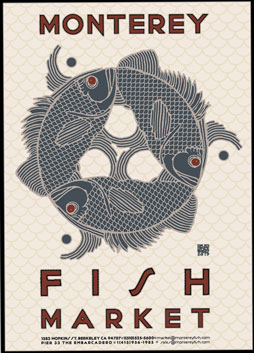
Click on image for detail
(249) Monterey Fish Market:
January 22. 2020
16-3/16” x 24"
Six Colors
Paper: Finch Fine Cover Ultra-smooth100 pound
Client: Monterey Fish (Kelley Johnson)
1-125: Saint Hieronymus Press
A-Aa: Artist’s own use:
|
Between 1380 and 1386, Zeeland fisherman William Beukelszoon devised a method of fish preservation that allowed the Dutch to become a seafaring power. He discovered that removing the gills and part of the gullet(which made the fish taste bitter), while leaving the liver and pancreas (which released enzymes essential to the flavor), then placing the fish in a barrel with with one part salt to 20 herring, then left to cure, allowed “fish to keep, and that fish can be packed and exported.” Herring busses in their hundreds off the Shetlands and Dogger Banks used drift nets to catch vast numbers of the fish, which led to an eventual move from trading in herring to colonizing and the establishment of a Dutch Empire.
By the middle of the 17th century, the wealthy Dutch had largely replaced the Portuguese as the main traders in Asia. In the East Indies, the Dutch gained control of the profitable trade in spices and soon had Europe’s largest mercantile fleet. This, of course. set them against the English, who were subsequently handed a shellacking in six major battles. In 1688 the Dutch actually invaded England, deposed the Catholic James II and installed his son-in-law, the Protestant William of Orange as king, thereby uniting the two great sea powers. William of Orange proved more loyal to the English than to the Dutch, making them a subordinate naval power. After 1713 the Dutch Republic went into decline, and the disastrous Anglo-Dutch war of 1789-1784 displaced the Dutch and allowed the Royal Navy to become the world’s dominant naval power.
Meanwhile, France, smarting from humiliating defeats by the British in the Seven-Year’s War, sought to enhance its reputation and undermine that of Britain by allying itself with the American revolutionaries and supplying them with arms, uniforms, supplies, soldiers and money. The Treaty of Paris was signed between France, Britain and the United States in 1783, but so far from being a triumph for France, it was a disaster. The fiscal troubles of France spiraled out of control and led in only a few years to the French Revolution and the destruction of the monarchy. Thus, the humble herring, all unbeknownst, created and set vast empires at one another’s throats, overthrew centuries of monarchy and transformed the world.
|